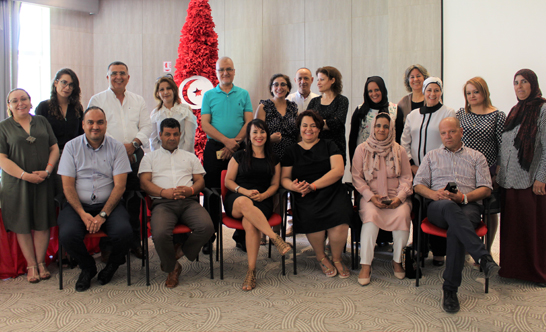MIGRATION
Presentation of the project to the regional delegations of the ONFP in Djerba

Group photo © UNFPA Tunisia.
The project "Access to essential services and information on sexual and reproductive health and gender-based violence, for vulnerable migrants and members of host communities, in particular women and young people in Tunisia” is coordinated by UNFPA Tunisia and supported by the Italian international cooperation.
The project will be implemented over two years and in six regions: Tunis, Sousse, Sfax, Médenine, Tataouine and Gasfa. The project targets mainly women and young and seeks to reinforce the provision of services, the communities access to information and rights and to improve knowledge on phenomena related to migration in Tunisia.
The management and the supply of services and information on SRH and GBV are provided through spaces safe for women run by the partner associations, the SRH spaces dedicated to migrants and refugees and the state’s structures involved in the service delivery. Strengthening these centers in terms of financial and technical support and local and national coordination is one of the main objectives of the project.
Through this project, UNFPA aims to standardize and generalize access to SRH services through support to the centers under the supervision of the National Board on Family and Population and its mobile teams to relaunch and strengthen proximity services for migrants in their communities.
In continuation to its engagement toward the mainstreaming and the standardization of the management of the different aspects of SRH and gender-based violence, we are planning capacity building actions for the benefit of front-line workers and key sectors on standards of care for sexual violence survivors, gender-based violence survivors, humanitarian response, etc.
It is expected that through this project, various outreach and awareness activities will be implemented to highlight the stigma against migrants, advocate for GBV prevention and the removal of all barriers hindering the universal access to SRH of migrants. These awareness and education campaigns target both the general public, key interveners and the main beneficiaries of the project.
Finally, we intend to generate evidence on migration in Tunisia. Data on migration is not always available and reliable to inform policies and programs. Thus, there is an urgent need for tailored and updated research on migrations to support evidence-based advocacy.
Precise and relevant data, disaggregated by age, sex, socioeconomic status, origin and destination of the migratory journey, are difficult to obtain, but essential to meet the urgent needs of migrants in real time.
As part of this project, we are collaborating with the following partners:
- •National Board on Family and Population (ONFP)
- •Ministry of Women, Family, Children and Seniors
- •The Center for Research, Studies, Documentation and Information on Women ( CREDIF )
- •Tunisian Association for Reproductive Health (ATSR)
- •Association for Sustainable Development and International Cooperation of Zarzis (ADDCI)
- •Tunisian Association For Management And Social Stability (TAMSS)
- •Tunisian Association of Democratic Women (ATFD)
- •The South Gafsa Development Association ( ADGS )
- •Beity
- •Doctors of the World
- •Association of African Students and Trainees in Tunisia ( AESAT - Sfax )
- •Tunisian Refugee Council (CTR - Sfax)
If you work with migrants and you want to collaborate with us, contact us on tunisia.office@unfpa.org
